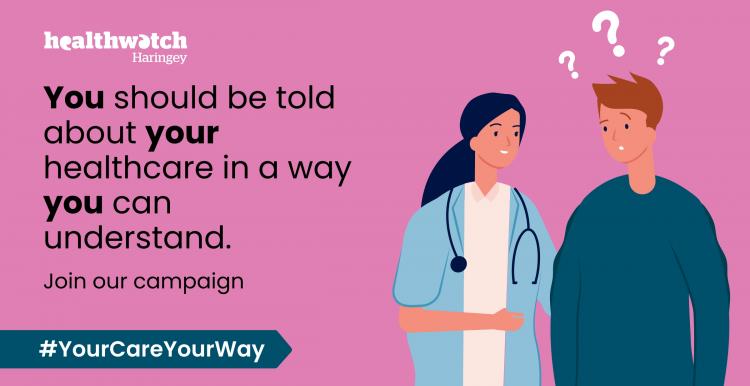The Accessible Information Standard – what you can expect from services

The standard aims to make sure that people who are disabled, or have an impairment or sensory loss get information that they can access and understand and that they get any communication support they need from health and care services.
Organisations are required to provide alternative formats where required, such as braille, large print, and easy read. They must also support people to communicate, for example by arranging a British Sign Language (BSL) interpreter, deafblind manual interpreter or an advocate.
Trying to get information about my own healthcare, in a format I can understand, has often been difficult. I can’t read letters that come through the post, or prescription medications. I feel forgotten, ignored, and not taken seriously. All I’m asking for is consistency, training on accessible information for staff - a few minor changes would make the world of difference to people like myself.
What do health and care organisations have to do?
- Ask if you have any communication needs, and ask how these needs can be met.
- Record your needs in a clear and set way and highlight these needs in your file or notes so people are aware and know how to meet them.
- Share information about your communication needs with other providers of NHS and adult social care, when they have consent or permission to do so.
- Deliver information to you in a way you can access and understand, with the option for communication support if needed.
What should you expect?
So, if you’re speaking to a dentist, doctor, care home manager or any other provider of health and social care, here’s what you can expect:
- You should be able to contact, and be contacted by, services in accessible ways, for example via email or text message.
- Information and correspondence should be given in formats you can read and understand, for example in audio, braille, easy read or large print.
- You should be supported by a communications professional at appointments if this is needed to support conversation, for example, a British Sign Language interpreter.
- Health and care staff and organisations should support you to communicate, for example, to lip-read or use a hearing aid.
What can you do if your communication needs are not met?
We know that not all services are fully compliant with the Accessible Information Standard.
If you do not receive information about your health and care in a format that suits you, you can:
- Remind service staff that they have a legal duty to provide accessible information under the Accessible Information Standard.
- Make an informal complaint to the nearest Patient Advice and Liaison Service which can help you to resolve issues informally.
- Make a formal complaint. If you’re thinking about making a complaint, you are entitled to support from the independent NHS Complaints Advocacy Service.
- Share your experience with your local Healthwatch, who will feed back to local services and decision-makers, as well as feed into Healthwatch England’s national advocacy work.
- Get involved with your local Patient Participation Group or patient reference group – groups of patient volunteers which work to represent the voices of patients and improve services.
Use the button below to find out more about making a complaint in Haringey.
The obstacles people face trying to access information they understand
The lack of support from services has a detrimental impact on people who need it most. The views of 6,200 people shared with Healthwatch show the incredible difficulties and obstacles people face trying to access the care they vitally need – leaving them frustrated, concerned about their health, and reliant on others.
Just a handful of examples people shared include:
- Dental practices not getting hearing induction loops installed
- GPs refusing people access to a sign language interpreter
- Low staff awareness, with D/deaf people reporting that staff communicated by shouting
- During the pandemic, the lack of accessible information prevented people from understanding national COVID-19 guidance.
- Physical barriers, such as the introduction of masks, made it harder for people to understand healthcare staff.
Your Care, Your Way survey
Clear, understandable information is important to help you make decisions about your health and care and get the most out of services.
Our campaign ‘Your Care, Your Way’ aims to:
-
Find out how well health and care services are delivering the accessible information standard.
-
Make sure that, if the standard covers you, you know your rights.
-
Find out who else has problems understanding information about their healthcare and needs to be covered by the standard.
So you can take part and share your experience, Healthwatch England has produced a survey in multiple formats.
Find out more about the Accessible Information Standard from the NHS website.

